- News
- Reviews
- Bikes
- Components
- Bar tape & grips
- Bottom brackets
- Brake & gear cables
- Brake & STI levers
- Brake pads & spares
- Brakes
- Cassettes & freewheels
- Chains
- Chainsets & chainrings
- Derailleurs - front
- Derailleurs - rear
- Forks
- Gear levers & shifters
- Groupsets
- Handlebars & extensions
- Headsets
- Hubs
- Inner tubes
- Pedals
- Quick releases & skewers
- Saddles
- Seatposts
- Stems
- Wheels
- Tyres
- Tubeless valves
- Accessories
- Accessories - misc
- Computer mounts
- Bags
- Bar ends
- Bike bags & cases
- Bottle cages
- Bottles
- Cameras
- Car racks
- Child seats
- Computers
- Glasses
- GPS units
- Helmets
- Lights - front
- Lights - rear
- Lights - sets
- Locks
- Mirrors
- Mudguards
- Racks
- Pumps & CO2 inflators
- Puncture kits
- Reflectives
- Smart watches
- Stands and racks
- Trailers
- Clothing
- Health, fitness and nutrition
- Tools and workshop
- Miscellaneous
- Buyers Guides
- Features
- Forum
- Recommends
- Podcast
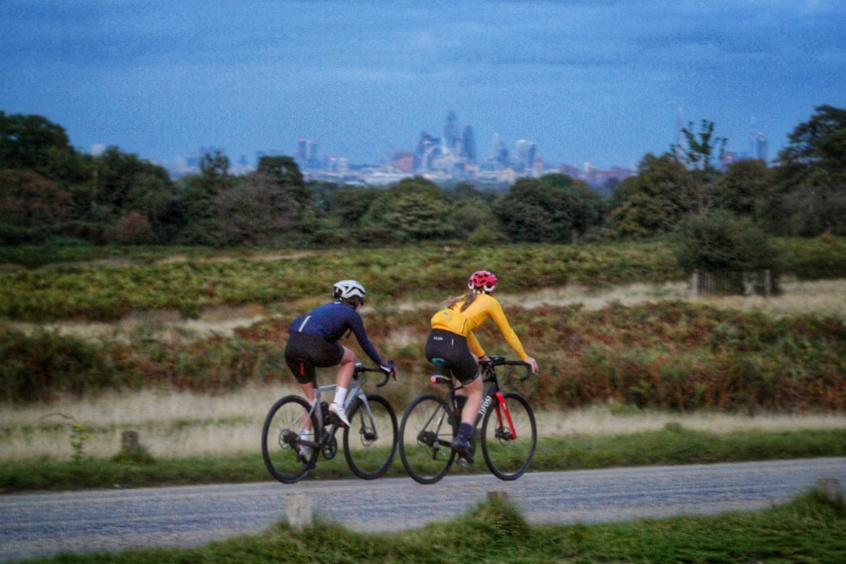 Cyclists in Richmond Park with London skyline (copyright Simon MacMichael)
Cyclists in Richmond Park with London skyline (copyright Simon MacMichael)Charity that runs London parks wants new laws to prosecute cyclists for breaking 20mph speed limit in Regent's Park and Richmond Park
The charity responsible for London's Royal Parks has asked the government to amend legislation "with a view to setting speed limits for cyclists" in its parks which, if introduced, could see riders exceeding 20mph speed limits prosecuted.
The organisation runs London's Royal Parks — two of which, Richmond Park and Regent's Park — are popular with the capital's cyclists and attract a large number of two-wheeled visitors throughout the year.
Writing to Sir Chris Bryant, the Minister for Creative Industries, Arts and Tourism, the Telegraph reports that The Royal Parks chairman Loyd Grossman (the former presenter of MasterChef and Through the Keyhole) has asked government to amend laws so that cyclists failing to adhere to the parks' 20mph speed limits can be prosecuted for speeding.
The letter comes at the end of a summer when The Royal Parks cited cyclists riding "at excessive speeds" and causing crashes as the reason for it reviewing its cycling policy, while also cancelling early-morning time trial events in Richmond Park and the London Duathlon.
In May, Strava was asked to remove "Regent's Park as a segment on the app" by The Royal Parks, the move coming following the death of a pensioner who died from her injuries sustained in a collision with a cyclist riding laps of the park at 25-29mph.
The death of Hilda Griffiths in 2022, a case much-publicised earlier this year following a coroner's inquest, sparked Royal Parks action on cycling, as well as Conservative MP Iain Duncan-Smith to launch his campaign for stricter punishments for cyclists who kill or injure.
It was heard at the inquest that the cyclist involved, Brian Fitzgerald, would not face prosecution as the Metropolitan Police deemed there was "insufficient evidence for a real prospect of conviction". He was riding laps of Regent's Park as part of a group ride travelling at between 25-29mph when he hit the 81-year-old pedestrian as she crossed the road, causing her several broken bones and bleeding on the brain, injuries she died from in hospital two months later.
The letter written to government seeks an amendment to The Royal Parks and Other Open Spaces Regulations 1997 "with a view to setting speed limits for cyclists".
"This will match what is already in place for motor vehicles on our park roads, namely a maximum speed limit of 20mph," Mr Grossman writes. "Whilst we recognise there are challenges associated with this request, most notably on enforcement, we believe it is a change that would improve safety within the parks for both cyclists and other park users."
A spokesperson for the charity added: "We have a responsibility to everyone who uses the parks to ensure we are acting in a way that protects and promotes their safety."
A source from the Department for Digital, Culture, Media & Sport said the proposal would be considered "carefully".
Discussion around speed limits in The Royal Parks, notably Richmond Park, have been long running.
Despite initially suggesting speed limits did apply to cyclists, in 2021 it was confirmed that the park's speed limits (which range from 5mph to 20mph) do not apply to cyclists, a stance in line with the wider law.
Then, in the summer of 2022, The Royal Parks said that even if the speed limits do not apply to cyclists, riders would still have action taken if they ride "recklessly".
In July, we reported that a group claiming to represent cyclists who use the park (Richmond Park Cyclists) had clashed with the charity over its speed limit advice for riders using the park.
This summer's Richmond Park Time Trials were also cancelled by The Royal Parks. Organised by the London Dynamo cycling club and first run in 2009, they were due to take place on 23 June and 7 July this year – and had been praised for their inclusivity and for providing a gateway into the sport, enabling beginners to compete on road bikes and on almost traffic-free roads due to their 6am starts.
However, The Royal Parks cancelled this summer's events over fears riders would break the park's 20mph speed limit, a decision which left organisers "fuming" and arguing the decision had been clouded by "very irresponsible journalism" and that the alternative is "busy roads and fast-moving cars".
"Following several cycling-related incidents, it is our duty to take action to minimise the risk of accidents and our priority to ensure the safety of all cyclists together with other visitors," Richmond Park's manager said. September's London Duathlon in the park was subsequently also cancelled.
The Royal Parks has received plenty of criticism over the years for its approach to improving road safety in its parks. Many, including the London Cycling Campaign (LCC), have repeatedly asked why through-traffic is still allowed to use Richmond Park as a shortcut, the campaign calling the cancellation of well-organised events "weak" while "daily rat-runs" continue.
While some of Richmond Park's roads are closed to motor traffic on weekends, during weekdays the green space, which The Royal Parks proudly calls an "extraordinary landscape" that is also London's largest Site of Special Scientific Interest and a National Nature Reserve, is used as a cut-through for motorists driving between Kingston upon Thames, Richmond and Roehampton.
[Sunny summer weekend traffic in Richmond Park]
The LCC has campaigned for the park to be closed to through-traffic for years, arguing it would improve road safety and make them "far better for people walking, cycling and relaxing in".
💩 Want safety @theroyalparks? Don't use parks as through-roads.
We're disappointed, yet again, by the behaviour of Royal Parks charity. Having Regent's & Richmond Park as daily rat-runs while cancelling @londonduathlon is weak. Our CEO @TomFyans on @itvlondon pic.twitter.com/ixWtHbfT7j
— London Cycling Campaign (@London_Cycling) August 22, 2024
Two weeks ago, specialist cycling insurance provider ETA Services Ltd called it an "ongoing embarrassment" that The Royal Parks "allows this nature reserve to be used as a rat-run", the comments coming in response to the incident below.
Officers from @MPSRoyal_Parks have been dealing with a road traffic collision in #RichmondPark where a vehicle has left the carriageway and collided with a tree. The driver has been reported for dangerous driving and no insurance. pic.twitter.com/zsgkkoz4Lw
— Royal Parks Police (@MPSRoyal_Parks) October 8, 2024
Dan is the road.cc news editor and joined in 2020 having previously written about nearly every other sport under the sun for the Express, and the weird and wonderful world of non-league football for The Non-League Paper. Dan has been at road.cc for four years and mainly writes news and tech articles as well as the occasional feature. He has hopefully kept you entertained on the live blog too.
Never fast enough to take things on the bike too seriously, when he's not working you'll find him exploring the south of England by two wheels at a leisurely weekend pace, or enjoying his favourite Scottish roads when visiting family. Sometimes he'll even load up the bags and ride up the whole way, he's a bit strange like that.
Latest Comments
- momove 26 min 47 sec ago
Precisely on point about the parking. There'd be almost no issues if all the space allocated to car parking was provided for bike parking instead....
- Pedal those squares 41 min 17 sec ago
IMHO he should be prosecuted to the full extent possible and band from all sporting events for a VERY long time. Otherwise there is no real...
- Spangly Shiny 57 min 20 sec ago
I'm pretty sure the dear lady is still very much alive and kicking. Reports of her demise are at least, a tad premature.
- chrisonabike 56 min 42 sec ago
What is "progress" though?...
- Secret_squirrel 3 hours 1 min ago
Thats if you believe that a slightly bigger bearing surface translates in any meaningful way to "pedaling stiffness" which to my mind is the...
- chrisonabike 3 hours 7 min ago
Everyone carrying more / brighter searchlights will fix things? Perhaps it helps sometimes, but I think this leads to other issues. We're already...
- SecretSam 3 hours 9 min ago
Lake's naming and sizing: never knowingly comprehensible. Good shoes, baffling range.
- hawkinspeter 3 hours 12 min ago
Yeah, I doubt if Arron Banks would be happy visiting "little Somalia" (as he referred to Bristol) and certainly I don't think Bristol's residents...
- ChasP 3 hours 49 min ago
It could be used as a reliable comparison without any calculations.
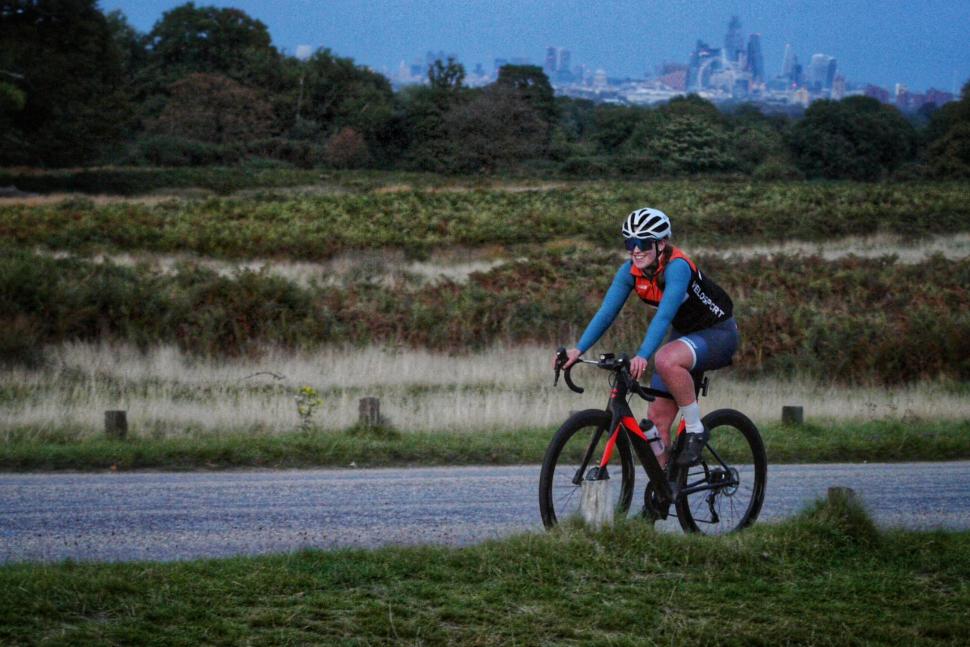

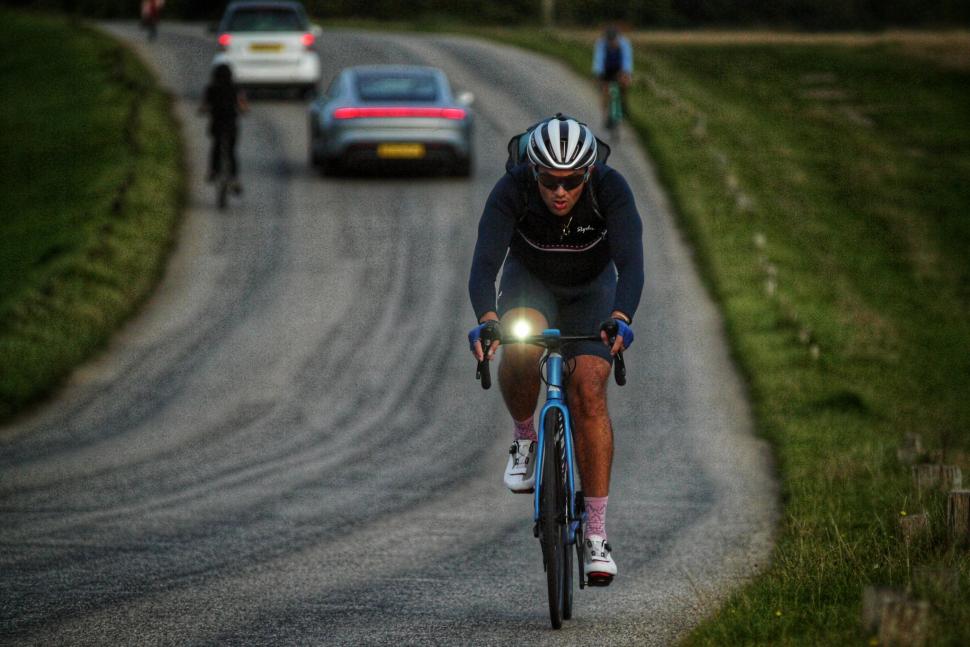
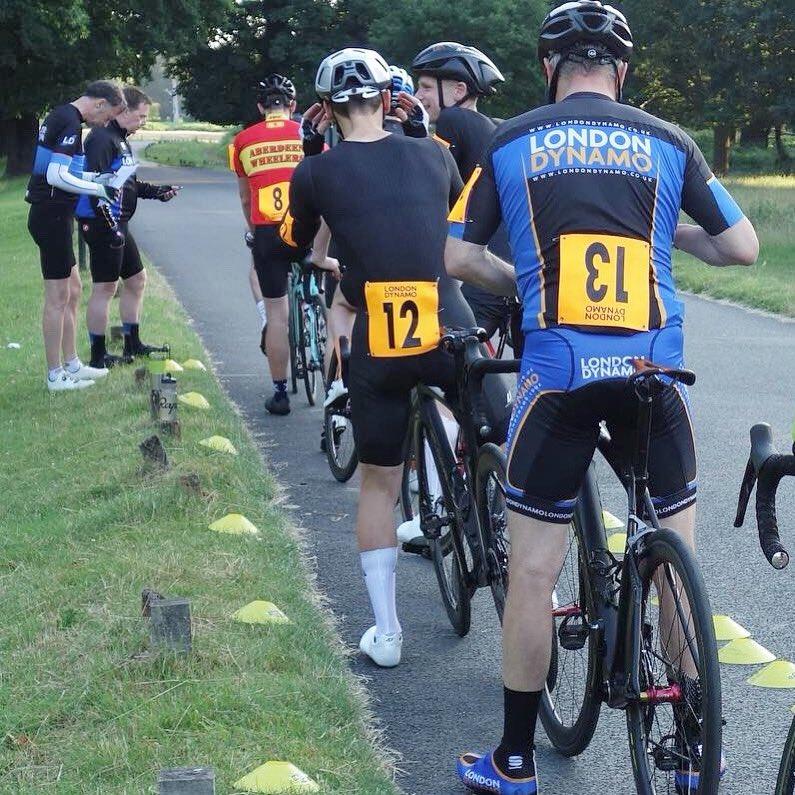
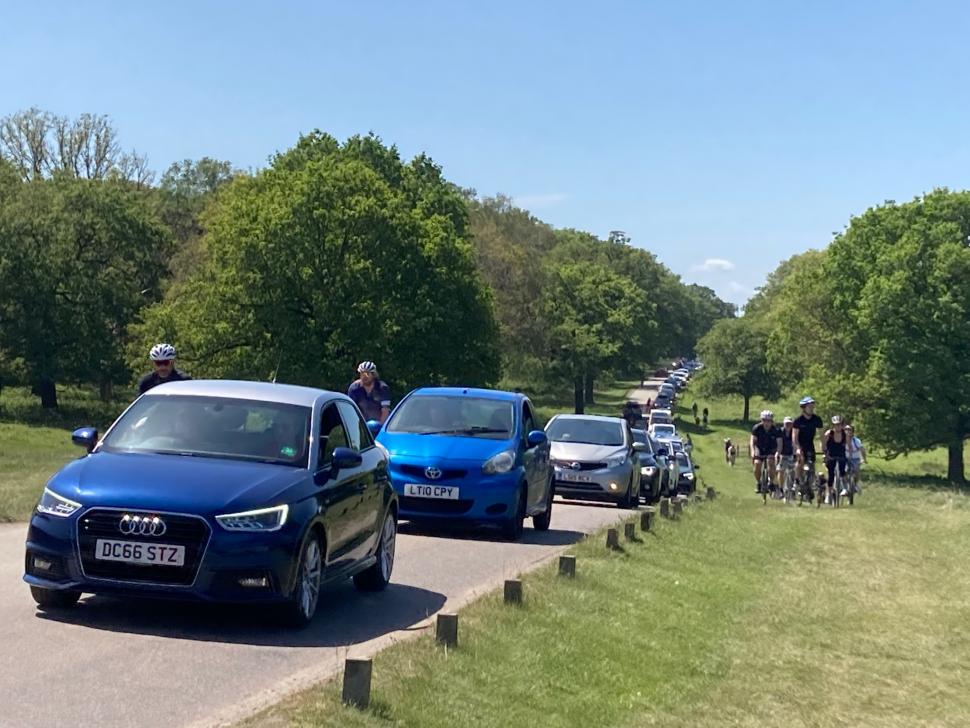
Add new comment
69 comments
I agree wholeheartedly with your remarks in general but I think speed guns can capture bike speeds pretty accurately, can't they? In several places where I ride regularly there are those signs on lamp posts that light up with your speed and a smiling or frowning emoji depending on whether or not you are under the speed limit; the speed they show when I trip them is always the same as the reading on my GPS device. Before Royal Parks had to back down and admit that the speeding laws in their parks don't apply to cyclists they handed out quite a few speeding tickets to cyclists caught with radar guns, I don't recall anyone challenging the validity of their measurements.
Yes, they haven't been challenged yet. My understandign is that the accuracy with cyclists/bikes is nowhere near that of cars, and a measurement wouldn't stand up in court unless it was miles over the limit.
Trouble is it's quite easy to be miles over the limit in Richmond Park, there are several long steepish descents where you can get up to about 30 mph virtually freewheeling, especially coming down Sawyer's Hill from Richmond gate to Roehampton Gate, it's around 2.5 km, average 2.5% (7% maximum) gradient, if you set out about 15 mph at the top you can easily reach 30 mph at the bottom.
Not my experience at all. It's usually somewhere in the ballpark, but not unusual (particularly when there are other vehicles around, but sometimes when there's not) for it to give a completely nonsensical reading. And in any case, there's a difference between being good enough to give a close enough reading most of the time that people believe them enough to adjust their speed, and being reliably accurate enough that the reading would stand up in court.
I don't think it would be that difficult to come up with a measurement system that would stand up even if the radar did not, for example the painted lines that accompany fixed speed cameras.
It also seems possible this would be an FPN offense, where the cyclist is in effect asked to admit to the offense or risk a court appearance, bigger fine, etc.
As for requiring a speedo on the bike, the courts might just take the view that they are widely available and a cyclist that risks exceeding the (fast for an average citizen, if not a trained rider) speed limit is well advised to obtain one.
When you trip them is the key point here. I would estimate 50% of those devices don't register my passing at all and others give a reading so far removed from the truth that I can only think they are picking up a vehicle approaching behind rather than me. Any device that suggests I am capable of doing 41mph on the flat nearing the end of a 100 mile ride is living on a different planet to reality.
Just take off and nuke that nut from orbit - it's the only way to be sure…
While 'furious cycling' isn't smart, it's obvious to anyone who has any idea of the UK's road safety data that cyclists are not the problem on the country's roads.
Obviously not, but it is not unreasonable to expect cycles to largely confirm to the same same speed limits as other road traffic. My experience in Richmond Park is that you are far more likely as a pedestrian to be waved across the road by a slowing motor car driver than the sometimes almost rear wheel to front wheel columns of mile hungry cyclists to be found on a weekend morning.
Pages